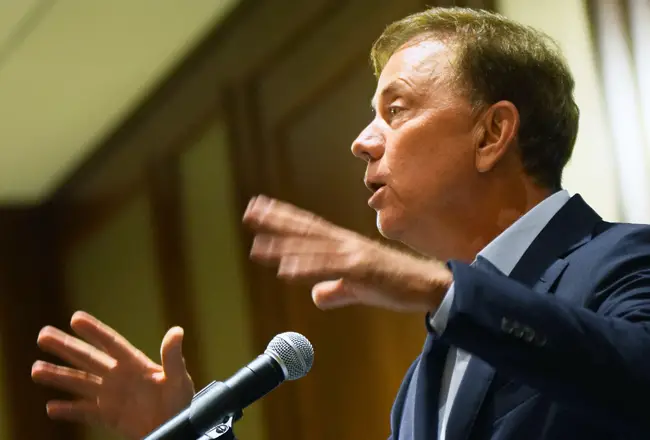CT Gov. Ned Lamont punts tolls issue to January; special session on hospital settlement set for next week
The year apparently will with no legislative action taken on tolls, as state lawmakers have announced plans to take up the issue during a special session in January.
Gov. Ned Lamont had been pushing for a special session of the General Assembly to convene during the week of Dec. 16 to discuss his transportation plan, which in its latest iteration would only charge trucks at gantries placed at a dozen bridge-adjacent highway sites. However, details of the governor”™s revised, $19.4 billion CT2030 transportation plan are still being worked out.

“We are committed to investing in transportation without recklessly raiding the rainy day fund, which will only lead to increased taxes and drastic cuts to education, municipal aid, and other vital state programs and services in the future,” Lamont, Senate President Pro Tempore Martin Looney, Senate Majority Leader Bob Duff, Speaker of the House Joe Aresimowicz, and House Majority Leader Matt Ritter said in a joint statement.
The “raiding the rainy day fund” reference is to the Republicans’ own transportation plan, which would use $1.5 billion of the state”™s projected $2.9 billion budget reserves to pay down pension liabilities, producing an annual savings of $130 million that would then be spent on transportation infrastructure.
Lawmakers on both sides of the issue ”“ essentially Lamont”™s fellow Democrats in favor of tolls, and Republicans against them ”“ have also spoken in favor of a public hearing on the issue before a vote is taken. Along with the looming holidays and hopes to finalize a settlement with the Connecticut Hospital Association over the state”™s “hospital tax” and Medicare reimbursements ”“ the latter expected to take place during a special session on Dec. 18 ”“ the belief is that there would be insufficient time to fully debate the tolls issue this month.
“We also want to provide clarity to Connecticut”™s cities and towns that rely on municipal aid and funds contained within the bonding bill,” according to the Democrats’ joint statement. “Once the bill is passed, we are committed to scheduling an immediate meeting of the Bond Commission to allocate bonding to cities and towns.”
Meanwhile, the Yankee Institute for Public Policy has reported that, according to emails obtained through a Freedom of Information request, some Connecticut lawmakers have discussed leasing part of the state”™s tolling infrastructure to telecommunication companies looking to develop 5G wireless technology.
Toll gantries would be connected with fiber optic cables to transmit and process E-ZPass information and license plate photographs.
The report cited an April 29 email from Rep. Stephen Meskers, D-Greenwich, to Deputy Chief of Staff Jonathan Dach and Director of Legislative Affairs Chris Soto that said the administration should consider contacting “all the telco guys” to determine “what a backbone in our interstate tolling network would be worth to lease out.”
“We might have to overbuild the fiber optic capacity on the toll roads but it could be worth some serious money,” Meskers wrote.
Lamont”™s telecommunications background includes managing Cablevision”™s Fairfield County startup operation, and serving as founder and chairman of Greenwich telecommunications company Lamont Digital Systems. He sold that firm to Apogee in 2015.